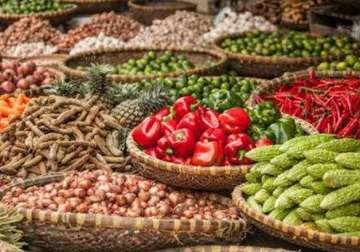Kolkata: While West Bengal may be able to meet its rice output target this year, it may soon be faced with inflationary prices in the vegetable market if the monsoon downpour continues in excess, experts say.
"As of now, in July the rainfall is more than sufficient. If there is a delay of rains in early August it can still be managed and paddy production won't be hit. However, excessive rains are bad for vegetables," Pradip Mazumdar, the advisor to the chief minister on the agricultural and allied sectors, told IANS.
In July, the Gangetic region of West Bengal - which produces the bulk of paddy and a substantial amount of vegetables - has received an average rainfall of 74 cm while the seasonal average for the period is 53 cm on an average.
The sub-Himalayan region (in northern Bengal) - mainly covering the tea and fruit producing areas - on the contrary has received an average of 88 cm of rainfall against a seasonal average of 103 cm.
"There is an excess rainfall of 39 percent in the Gangetic region while the sub-Himalayan region in the state has recorded a deficit of 15 percent," Devendra Pradhan, the deputy director general at IMD Kolkata, told IANS.
West Bengal has targeted 175 lakh tonnes of clean rice this year and will be bringing 60,000 hectares under pulses.
"On vegetables, there will be concerns if the rainfall is in excess. The average price of vegetables in the market is Rs.40 a kg at this moment," Mazumdar said.
He expressed concern over the vegetable prices in case of excessive rains but assured that potato prices would remain stable at Rs.10 a kg under prevailing market conditions.
The state has 60 lakh tonnes of potatos in its storehouses at the moment.
He said while the Malda, Nadia, Burdwan, Hoogly, Birbhum, Burdwan, West Midnapore and North 24 Parganas districts have received substantial rainfall, it hs been marginally lower than the average in north Bengal.
Asked if it will affect production in the tea gardens in Darjeeling and Jalpaiguri districts, Mazumdar said: "The first and second flush - which produces the best quality tea - has already been harvested and so far it is not a drought situation there which will affect tea production."
The adviser to the chief minister said even distribution of the average rainfall throughout the monsoon season is essential for the crops as is its distribution in the districts.
"I think this season, there will be a good amount of rainfall. Some 50-60 percent of the total rainfall in the monsoon period has already occurred and over the next 48 hours (till Thursday evening) there is warning of heavy rains", Pradhan added.
Abhirup Sarkar, an economist and professor at the Indian Statistical Institute, also expressed concern over the future of vegetable prices in the state.
According to Sarkar, if there is the rainfall is scarce, vegetable production will be hit which will pull up the prices. Also, if the downpour is excessive, then vegetables might rot - which again will jack up the prices
"Prices are already up and it will scale up further in the coming days if rainfall falls short or exceeds expectations," Sarkar told IANS.
He said dependence of crops on the monsoon needs to be minimized and irrigation facilities should be augmented.
"Some 50-60 percent of the total cultivable area in the state is under irrigation at the moment. This needs to be increased” , Sarkar said.
Latest India News
